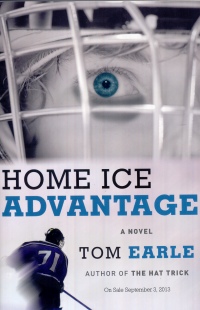| ________________
CM . . . . Volume XX Number 3 . . . . September 20, 2013
excerpt:
Possessing a natural goal-scoring touch with tremendous hockey-sense and speed to match, 12-year-old Jake Dumont is among the elite players of the Greater Toronto Hockey League. But if he is ever to attract the eye of scouts and get a shot at the OHL, Jake must learn to play with greater discipline and toughness-at least, that is what his father tells him (regardless of how well he plays) after each and every game. Fed up with this demented style of coaching, which is almost always accompanied by severe physical violence, Jake, under the cover of early morning darkness, leaves home to find refuge in the large expanse of big-city Toronto. Miraculously, Jake discovers sanctuary in the hallowed hockey grounds of the boarded-up Maple Leaf Gardens and kindness and companionship in a forgotten hero and legend, who, just like Jake at the moment, also happens to be homeless. While Earle borrows heavily at times from hockey history, in particular, the events surrounding the 1951 Stanley Cup final in which the Toronto Maple Leafs defeated the Montreal Canadiens, a considerable amount of creative licensing is employed to move the story along. As expected, for example, the homeless man Jake encounters and comes to rely on to navigate and survive the streets - Scooter Murphy - is wholly fictionalized. This, however, does not make Scooter any less believable or endearing as a character, nor does it diminish the reader's understanding of Jake's attraction to him; this is significant, given the age disparity – approximately seventy years or so – between Scooter and Jake (and any likely readers of this book). That each are both near helpless victims, but are still able to provide comfort and support to one another, albeit in very different ways, is no mistake. Apart from the book's central message – that which attempts to bring attention to the dangers of obsessive hockey parents and physical abuse and violence at home – there exist few other themes of consequence. While an attempt is made to cue readers to the importance of facing their fears, which is delivered through a reoccurring dream that Jake has in which he falls from a catwalk (that eventually plays out in real life), it comes across as overly simplistic and also a bit too forced, almost as if it was added as an afterthought. Similarly, with Jake arriving back home safe and sound at around the halfway mark, the book lacks a defining climax. The hockey sequences are, however, wonderfully rendered, reading at times like a play-by-play announcer, albeit in Jake's first person narrative. Likewise, Earle is able to capture the off-ice camaraderie and locker room shenanigans in a realistic fashion, successfully conveying the transcending nature of hockey as more than simply a game. In achieving this, a good measure of hockey specific jargon and knowledge is used throughout, although, it is not so dense as to deter hockey novices or frustrate beginner readers. Using sport as a means to deliver what is undoubtedly a difficult subject, Home Ice Advantage will be best received by young readers already keen on hockey. Slightly older readers possessing a penchant for similarly themed books should find their way to a copy of The Hat Trick, also by Earle, which chronicles the up-and-down hockey career of a 14-year-old Canadian boy from Junior A all the way to the NHL. Recommended. Andrew Laudicina, an MLIS graduate from the University of Western Ontario in London, ON, currently resides in Windsor, ON.
To comment
on this title or this review, send mail to cm@umanitoba.ca.
Copyright © the Manitoba Library Association. Reproduction for personal
use is permitted only if this copyright notice is maintained. Any
other reproduction is prohibited without permission.
NEXT REVIEW |
TABLE OF CONTENTS FOR THIS ISSUE
- September 20, 2013.
AUTHORS |
TITLES |
MEDIA REVIEWS |
PROFILES |
BACK ISSUES |
SEARCH |
CMARCHIVE |
HOME |
